16 start with U start with U


Deeply personal and yet universal in its truths, unalone draws on the Book of Genesis as a living document whose stories, wisdom, and ethical knots can engage us more fully with our own lives — whatever your religious tradition or spiritual beliefs. In this stunning and ambitious book, Jacobs reminds us that all poetry serves as a kind of prayer – a recognition of beauty, a spoken bid for connection, a yearning toward an understanding that might better guide us through our days. When you “dive / from the twin heights of your eyes,” “that tiny pool below” isn’t God. “Well, not exactly,” Jacobs comforts us. “It’s you. One breath deeper than you’ve / ever been, one breath closer to the heeded, heedful world.”
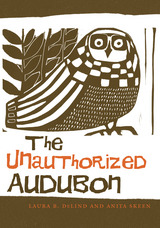
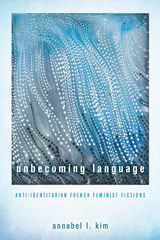
Kim’s close readings ultimately enliven the current conversation in French studies by serving as a provocation to return to reading literary texts deeply and closely, without subordinating literature to a pre-existing ideological framework—to let literature speak, to let it theorize. Tracking the influence of these writers on each other, Kim provides a new, original French feminist poetics and demonstrates that Sarraute, Wittig, and Garréta’s work allows for a hollowing out of difference from within, allowing writers and readers to unbecome—to break free of identity and exist as subjectivities without subjecthood. In looking at these writers together, Kim provides a defense of literature as liberatory— capable of effecting personal and political change—and gives readers an experience of literature’s revolutionary possibilities.
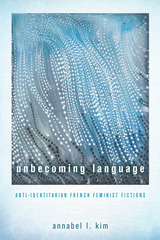
Kim’s close readings ultimately enliven the current conversation in French studies by serving as a provocation to return to reading literary texts deeply and closely, without subordinating literature to a pre-existing ideological framework—to let literature speak, to let it theorize. Tracking the influence of these writers on each other, Kim provides a new, original French feminist poetics and demonstrates that Sarraute, Wittig, and Garréta’s work allows for a hollowing out of difference from within, allowing writers and readers to unbecome—to break free of identity and exist as subjectivities without subjecthood. In looking at these writers together, Kim provides a defense of literature as liberatory— capable of effecting personal and political change—and gives readers an experience of literature’s revolutionary possibilities.
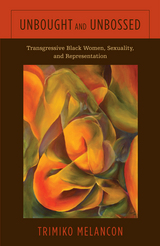
Drawing from black feminist and critical race theories, historical discourses on gender and sexuality, and literary criticism, Melancon explores the variety and complexity of black female identity. She illuminates how authors including Ann Allen Shockley, Alice Walker, and Gayl Jones engage issues of desire, intimacy, and independence to shed light on a more complex black identity, one ungoverned by rigid politics over-determined by race, gender and sexuality.
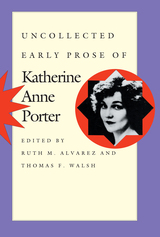
This volume brings together twenty-nine pieces dating from before 1932, none of which appeared in Porter's collected works and many of which are published here for the first time. Both fiction and essays are covered. All these pieces belong to Porter's apprenticeship as a creative writer. Thus, they offer new insights into her artistic development and her relationship with Mexico, a place that, as she later said, "influenced everything I did afterward."
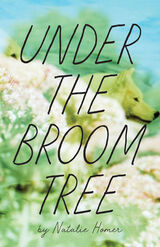
In the story of the prophet Elijah, he must flee his home, and, after an arduous journey, he arrives under a broom tree, where he prays for his own death. But in his sleep, he is touched by an angel who provides food and water. In this moment, the broom tree becomes a symbol for shelter in a barren landscape, a portent of hope and renewal.
Drawing inspiration from this tale, Natalie Homer’s debut poetry collection is a trek through the wildernesses of the heart and of the natural world. Exploring the idea of divine providence, Homer finds seams of light opening between forlorn moments and locates, “Something to run a finger through, / something to shine in the ocher light.” Within these narrow spaces, Homer explores themes of longing, home, family, and self-worth amidst the wondrous backdrop of the American West and the Rust Belt, while integrating a rich mythology of narrative, image, and association. The broom tree, offering the capacity for shade and respite, becomes a source of connection and an inspiration for the collection. It is an invitation to sink deep into the earth and self and feel the roots entwine.
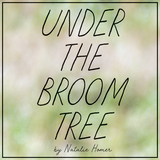
In the story of the prophet Elijah, he must flee his home, and, after an arduous journey, he arrives under a broom tree, where he prays for his own death. But in his sleep, he is touched by an angel who provides food and water. In this moment, the broom tree becomes a symbol for shelter in a barren landscape, a portent of hope and renewal.
Drawing inspiration from this tale, Natalie Homer’s debut poetry collection is a trek through the wildernesses of the heart and of the natural world. Exploring the idea of divine providence, Homer finds seams of light opening between forlorn moments and locates, “Something to run a finger through, / something to shine in the ocher light.” Within these narrow spaces, Homer explores themes of longing, home, family, and self-worth amidst the wondrous backdrop of the American West and the Rust Belt, while integrating a rich mythology of narrative, image, and association. The broom tree, offering the capacity for shade and respite, becomes a source of connection and an inspiration for the collection. It is an invitation to sink deep into the earth and self and feel the roots entwine.

Julie Carr’s deeply intimate collection, Underscore, is dedicated to two of Carr’s foundational teachers, the dancer Nancy Stark Smith and the poet Jean Valentine, both of whom died in 2020. Elegiac, tender, and at times erotic or bitter, these poems explore the passions of friendship and love for the living as well as the dead. Carr’s lyric poetry expresses the intricate many-layered relationships between individuals who are constantly shifting in their roles with one another. She considers otherness and nature while remaining deeply invested in human relationships and exploring the conflict of maintaining one’s own interiority amid a life whose backdrop is human suffering.
Reaching toward the “ghost companions in the thicket” and to the beloveds who still “pulse with activity,” Underscore’s sonically intricate poems express a longing for dynamic forces of intra-action, a sense of expanded encounter, and what Stark Smith called “overlapping kinespheres.”
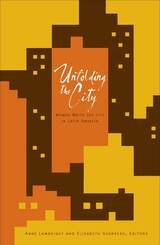
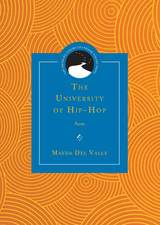

The work and times of the Black writer, editor, and intellectual
John Cullen Gruesser edits essays that explore the literary and journalistic career of Pauline Elizabeth Hopkins. A Black woman writer at the turn of the twentieth century, Hopkins worked as the unacknowledged editor-in-chief of the Colored American Magazine but also wrote short fiction, novels, nonfiction articles, and a play believed to be the first by a Black woman. Versatile and politically committed, she was fired when her strong editorial stands and non-conciliatory politics offended the new owner of Colored American Magazine.
A rare examination of an overlooked figure in Black letters, The Unruly Voice explores Hopkins’s writing and her significance for contemporary readers.
Contributors: Elizabeth Ammons; Kristina Brooks; Lois Lamphere Brown; C. K. Doreski; John Cullen Gruesser; Jennie A. Kassanoff; Kate McCullough; Nelly Y. McKay; and Cynthia D. Schrager
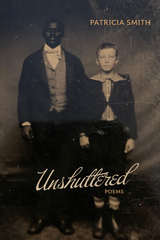
An award-winning author presents a portrait of Black America in the nineteenth century
Over the course of two decades, award-winning poet Patricia Smith has amassed a collection of rare nineteenth-century photographs of Black men, women, and children who, in these pages, regard us from the staggering distance of time.
Unshuttered is a vessel for the voices of their incendiary and critical era. Smith’s searing stanzas and revelatory language imbue the subjects of the photos with dynamism and revived urgency while she explores how her own past of triumphs and losses is linked inextricably to their long-ago lives:
We ache for fiction etched in black and white. Our eyes never touch. These tragic grays and bustles, mourners’
hats plopped high upon our tamed but tangled crowns, strain to disguise what yearning does with us.
The poet’s unrivaled dexterity with dramatic monologue and poetic form reanimates these countenances, staring back from such yesterdays, and the stories they may have told. This is one of American literature’s finest wordsmiths doing what she does best—unreeling history to find its fierce and formidable lyric.
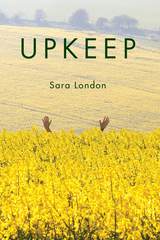
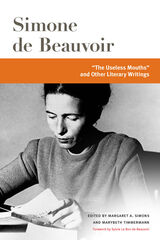
The volume begins with a new translation of the 1945 play The Useless Mouths, written in Paris during the Nazi occupation. Other pieces were discovered after Beauvoir's death in 1986, such as the 1965 short novel "Misunderstanding in Moscow," involving an elderly French couple who confront their fears of aging. Two additional previously unknown texts include the fragmentary "Notes for a Novel," which contains the seed of what she later would call "the problem of the Other," and a lecture on postwar French theater titled Existentialist Theater. The collection notably includes the eagerly awaited translation of Beauvoir's contribution to a 1965 debate among Jean-Paul Sartre and other French writers and intellectuals, "What Can Literature Do?"
Prefaces to well-known works such as Bluebeard and Other Fairy Tales,La Bâtarde, and James Joyce in Paris: His Final Years are also available in English for the first time, alongside essays and other short articles. A landmark contribution to Beauvoir studies and French literary studies, the volume includes informative and engaging introductory essays by prominent and rising scholars.
Contributors are Meryl Altman, Elizabeth Fallaize, Alison S. Fell, Sarah Gendron, Dennis A. Gilbert, Laura Hengehold, Eleanore Holveck, Terry Keefe, J. Debbie Mann, Frederick M. Morrison, Catherine Naji, Justine Sarrot, Liz Stanley, Ursula Tidd, and Veronique Zaytzeff.
READERS
Browse our collection.
PUBLISHERS
See BiblioVault's publisher services.
STUDENT SERVICES
Files for college accessibility offices.
UChicago Accessibility Resources
home | accessibility | search | about | contact us
BiblioVault ® 2001 - 2024
The University of Chicago Press









